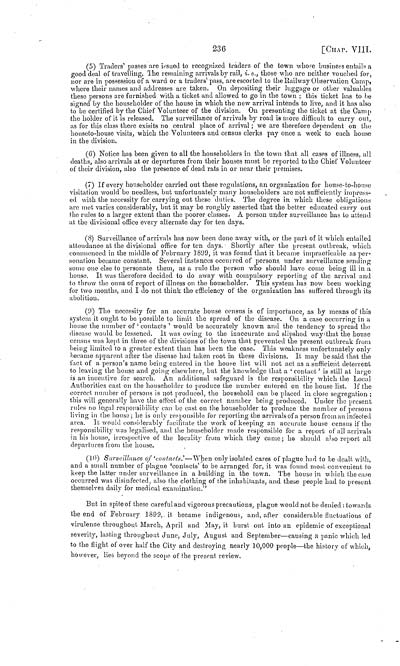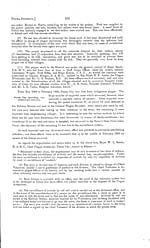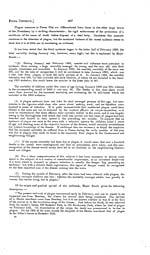Medicine - Disease > Bombay plague: being a history of the progress of plague in the Bombay presidency from September 1896 to June 1899
(305) Page 236
Download files
Individual page:
Thumbnail gallery: Grid view | List view

236 [CHAP. VIII.
(5) Traders' passes are issued to recoognized traders of the town whose business entails a
good deal of travelling. The remaining arrivals by rail, . e., those who are neither vouched for,
nor are in possession of a ward or a traders' pass, are escorted to the Railway Observation Camp,
where their names and addresses are taken. On depositing their luggage or other valuables
these persons are furnished with a ticket and allowed to go in the town ; this ticket has to be
signed by the householder of the house in which the new arrival intends to live, and it has also
to be certified by the Chief Volunteer of the division. On presenting the ticket at the Camp
the holder of it is released. The surveillance of arrivals by road is more difficult to carry out,
as for this class there exisits no central place of arrival ; we are therefore dependent on the
houseto-house visits, which the Volunteers and census clerks pay once a week to each house
in the division.
(6) Notice has been given to all the householders in the town that all cases of illness, all
deaths, also arrivals at or departures from their houses must be reported to the Chief Volunteer
of their division, also the presence of dead rats in or near their premises.
(7) If every householder carried out these regulations, an organization for house-to-houso
visitation would bo needless, but unfortunately many householders are not sufficiently impress-
ed with the necessity for carrying out these duties. The degree in which these obligations
arc met varies considerably, but it may be roughly asserted that the better educated carry out
the rules to a larger extent than the poorer classes. A person under surveillance has to attend
at the divisional office every alternate clay for ten days.
(8) Surveillance of arrivals has now been done away with, or the part of it which entailed
attendance at the divisional office for ten days. - Shortly after the present outbreak, which
commonoed in the middle of February 1899, it was found that it became impracticable as per-
sonation became constant. Several instances occurred of persons, under surveillance sending
some one else to personate them, as a rule the person who should have come being ill in a
house. It was therefore decided to do away with compulsory reporting of the arrival and
to throw the onus of report of illness on the householder. This system has now been working
for two months, and I do not think the efficiency of the organization has suffered through its
abolition.
(9) The necessity for an accurate house census is of importance, as by means of this
system it ought to be possible to limit the spread of the disease. On a case occurring in a
house the number of ' contacts ' would be accurately known and the tendency to spread the
disease would be lessened. It was owing to the inaccurate and slipshod way that the house
census was kept in three of the divisions of the town that prevented the present outbreak from
being limited to a greater extent than has been the case. This weakness unfortunately only
became apparent after the disease had taken root in these divisions. It may be said that the
fact of a person's name being entered in the house list will not act as a sufficient deterrent
to leaving the house and going elsewhere, but the knowledge that a 'contact' is still at large
is an incentive for search. An additional safeguard is the responsibility which the Local
Authorities cast on the householder to produce the number entered on the house list. If the
correct number of persons is not produced, the household can be placed in close segregation ;
this will generally have the effect of the correct number being produced. Under the present
rules no legal responsibility can be cast on the householder to produce the number of persons
living in the house; he is only responsible for reporting the arrivals of a person from an infected
area. It would considerably facilitate the work of keeping an accurate house census if the
responsibility was legalised, and the householder made responsible for a report of all arrivals
in his house, irrespective of the locality from which they came; he should also report all
departures from the house.
(10) Surveillance of 'contacts'-When only isolated cases of plague had to be dealt with,
and a small number of plague 'contacts' to be arranged for, it was found most convenient to
keep the latter under surveillance in a building in the town. The house in which the case
occurred was disinfected, also the clothing of the inhabitants, and these people had to present
themselves daily for medical examination."
But in spite of these careful and vigorous precautions, plague would not be denied : towards
the end of February 1899, it became indigenous, and, after considerable fluctuations of
virulence throughout March, April and May, it burst out into an epidemic of exceptional
seventy, lasting throughout June, July, August and September-causing a panic which led
to the flight of over half the City and destroying nearly 10,000 people-the history of which,
however, lies beyond the scope of the present review.
(5) Traders' passes are issued to recoognized traders of the town whose business entails a
good deal of travelling. The remaining arrivals by rail, . e., those who are neither vouched for,
nor are in possession of a ward or a traders' pass, are escorted to the Railway Observation Camp,
where their names and addresses are taken. On depositing their luggage or other valuables
these persons are furnished with a ticket and allowed to go in the town ; this ticket has to be
signed by the householder of the house in which the new arrival intends to live, and it has also
to be certified by the Chief Volunteer of the division. On presenting the ticket at the Camp
the holder of it is released. The surveillance of arrivals by road is more difficult to carry out,
as for this class there exisits no central place of arrival ; we are therefore dependent on the
houseto-house visits, which the Volunteers and census clerks pay once a week to each house
in the division.
(6) Notice has been given to all the householders in the town that all cases of illness, all
deaths, also arrivals at or departures from their houses must be reported to the Chief Volunteer
of their division, also the presence of dead rats in or near their premises.
(7) If every householder carried out these regulations, an organization for house-to-houso
visitation would bo needless, but unfortunately many householders are not sufficiently impress-
ed with the necessity for carrying out these duties. The degree in which these obligations
arc met varies considerably, but it may be roughly asserted that the better educated carry out
the rules to a larger extent than the poorer classes. A person under surveillance has to attend
at the divisional office every alternate clay for ten days.
(8) Surveillance of arrivals has now been done away with, or the part of it which entailed
attendance at the divisional office for ten days. - Shortly after the present outbreak, which
commonoed in the middle of February 1899, it was found that it became impracticable as per-
sonation became constant. Several instances occurred of persons, under surveillance sending
some one else to personate them, as a rule the person who should have come being ill in a
house. It was therefore decided to do away with compulsory reporting of the arrival and
to throw the onus of report of illness on the householder. This system has now been working
for two months, and I do not think the efficiency of the organization has suffered through its
abolition.
(9) The necessity for an accurate house census is of importance, as by means of this
system it ought to be possible to limit the spread of the disease. On a case occurring in a
house the number of ' contacts ' would be accurately known and the tendency to spread the
disease would be lessened. It was owing to the inaccurate and slipshod way that the house
census was kept in three of the divisions of the town that prevented the present outbreak from
being limited to a greater extent than has been the case. This weakness unfortunately only
became apparent after the disease had taken root in these divisions. It may be said that the
fact of a person's name being entered in the house list will not act as a sufficient deterrent
to leaving the house and going elsewhere, but the knowledge that a 'contact' is still at large
is an incentive for search. An additional safeguard is the responsibility which the Local
Authorities cast on the householder to produce the number entered on the house list. If the
correct number of persons is not produced, the household can be placed in close segregation ;
this will generally have the effect of the correct number being produced. Under the present
rules no legal responsibility can be cast on the householder to produce the number of persons
living in the house; he is only responsible for reporting the arrivals of a person from an infected
area. It would considerably facilitate the work of keeping an accurate house census if the
responsibility was legalised, and the householder made responsible for a report of all arrivals
in his house, irrespective of the locality from which they came; he should also report all
departures from the house.
(10) Surveillance of 'contacts'-When only isolated cases of plague had to be dealt with,
and a small number of plague 'contacts' to be arranged for, it was found most convenient to
keep the latter under surveillance in a building in the town. The house in which the case
occurred was disinfected, also the clothing of the inhabitants, and these people had to present
themselves daily for medical examination."
But in spite of these careful and vigorous precautions, plague would not be denied : towards
the end of February 1899, it became indigenous, and, after considerable fluctuations of
virulence throughout March, April and May, it burst out into an epidemic of exceptional
seventy, lasting throughout June, July, August and September-causing a panic which led
to the flight of over half the City and destroying nearly 10,000 people-the history of which,
however, lies beyond the scope of the present review.
Set display mode to: Large image | Zoom image | Transcription
Images and transcriptions on this page, including medium image downloads, may be used under the Creative Commons Attribution 4.0 International Licence unless otherwise stated. ![]()
| India Papers > Medicine - Disease > Bombay plague: being a history of the progress of plague in the Bombay presidency from September 1896 to June 1899 > (305) Page 236 |
|---|
| Permanent URL | https://digital.nls.uk/74586578 |
|---|




